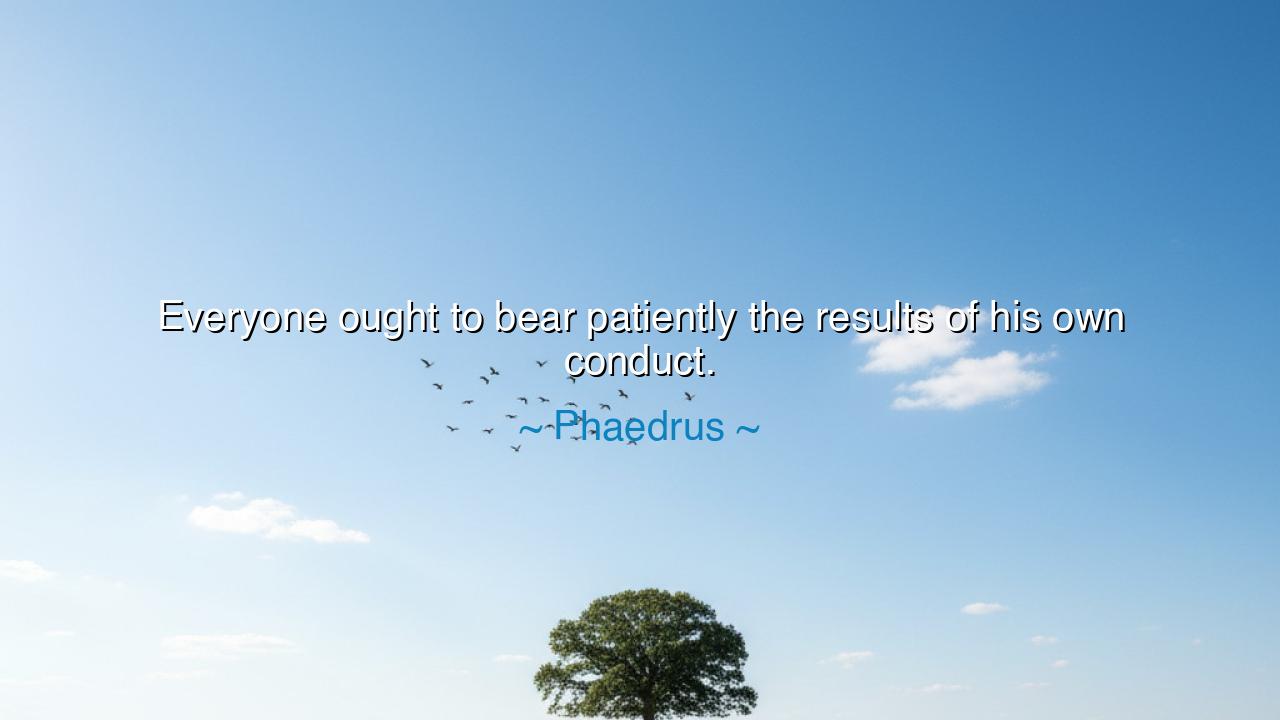
Everyone ought to bear patiently the results of his own conduct.






Hear, O seeker of truth, the wisdom of Phaedrus, the Roman fabulist who clothed lessons in the garments of beast and tale. He declared: “Everyone ought to bear patiently the results of his own conduct.” In this short saying lies the stern justice of life, a law as unyielding as stone: that what a man sows, he must reap, and that no lament, no excuse, no shifting of blame can erase the harvest of his own actions. The call is not merely to endure, but to endure with patience, for only in patient endurance is wisdom born.
The origin of this truth is rooted in the stories Phaedrus told, drawn from Aesop and expanded for Roman ears. His fables spoke of the fox and the crow, the wolf and the lamb, the farmer and the field. In each tale, creatures bore the weight of their choices. The proud often fell, the greedy found ruin, the deceitful were ensnared in their own lies. Through such parables he taught that the order of the world is just, though men may rebel against it: conduct always bears fruit, and that fruit must be eaten by the one who planted it.
Consider the tale of Napoleon, who rose like a storm upon Europe. Through genius, ambition, and relentless will, he grasped power, crowning himself emperor. Yet his hunger for conquest led him into the snows of Russia, where his armies perished. His exile to Elba, and later to Saint Helena, was no accident of fate, but the bitter fruit of his own conduct. And though he bore it unwillingly, the world saw in him the truth of Phaedrus’ words: no man escapes the harvest of his own deeds.
The ancients themselves taught the same. In the Greek tragedies, hubris—excessive pride—always brought downfall. Oedipus, seeking truth, brought ruin upon himself; Agamemnon, seeking glory, met death at the hand of his own wife. The chorus would remind the audience that the gods do not need to punish unjustly, for men’s own actions bring about their suffering. To live is to walk within this law, and to endure is to learn its lesson.
Yet Phaedrus does not merely call for recognition, but for patience. It is one thing to admit fault, another to bear the consequences without bitterness. Many rail against fortune, crying that life is unfair, when in truth it is their own choices that have led them to hardship. To bear patiently is to refuse despair, to accept responsibility, and to turn even suffering into a teacher. For in patience lies the seed of change; the man who learns from his harvest may plant better seed tomorrow.
The lesson, O children of tomorrow, is this: guard your conduct, for it is the architect of your destiny. Do not blame others for the fruit of your own planting. If you have sown folly, bear the burden with courage; if you have sown wisdom, enjoy the reward with gratitude. For in this acceptance lies dignity, and in dignity, the strength to rise again.
Therefore, let your actions be thus: live with foresight, knowing each choice carries consequence. When hardship comes, search not first for others to blame, but within your own deeds. Accept with patience what follows, and let it shape you into one wiser, steadier, stronger. For as Phaedrus declared, no one is exempt: everyone ought to bear patiently the results of his own conduct, and in this bearing, a soul is forged worthy of respect and honor.






AAdministratorAdministrator
Welcome, honored guests. Please leave a comment, we will respond soon